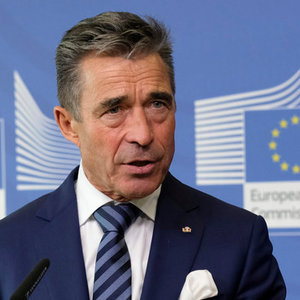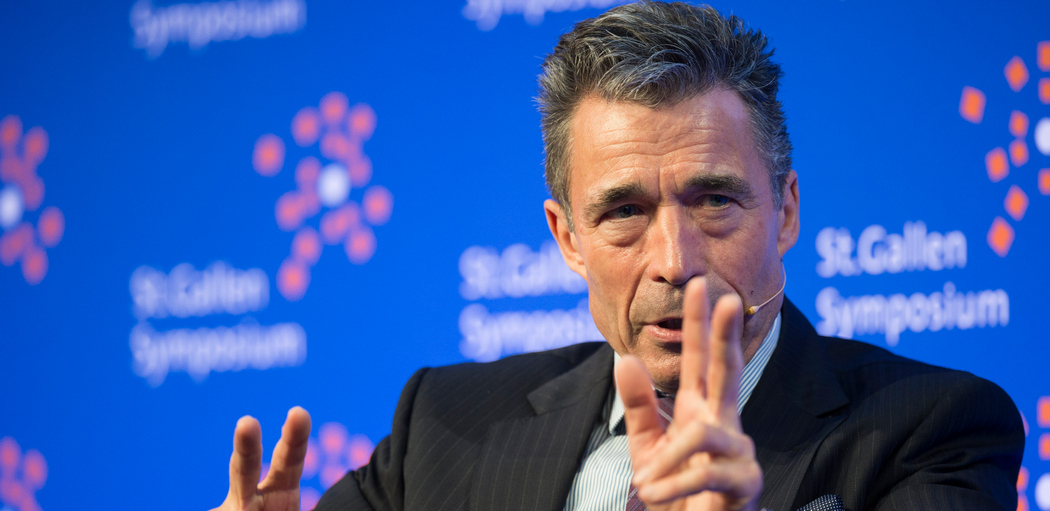
Place of Birth. Education. Born in the town of Ginnerup in the commune of Norddurs in the north-east of Jutland in a farmer's family. In 1972 he received a bachelor's degree in foreign languages and social sciences from the Viborg Cathedral School. In 1978 he graduated from the University of Aarhus with a master's degree in economics. In addition to Danish, he is fluent in English and French.
Career. He began his political career at the age of 17, having founded in 1970 the Society of Young Liberals in the city of Viborg. Already 3 years later he became a member of the Central Council of the Liberal Party of Denmark.
In 1974, barely reaching voting age, he ran for the Folketing (parliament), but did not pass. On the other hand, he was appointed national chairman of the Liberal Youth, and the following year he entered parliament for the first time when he replaced one of the ill deputies of the Liberal Party. In 1976 Rasmussen was appointed to the executive committee of the Danish Youth Council.
In 1978 he was first elected as a deputy and left the Youth Council. In the same year, he joined the Danish Federation of Small and Medium Enterprises as a consultant.
Since 1984 - a member of the leadership of the parliamentary faction of the Liberals, since 1985 - Vice-Chairman of the national organization of the Liberal Party, in 1987-1992. - Minister of Taxation of Denmark. He combined this post with the post of Minister of Economy from 1990 to 1992. In 1996 he became a member of the board of representatives, and in 1998 - the board of directors of the National Bank of Denmark.
Since 1998 - Chairman of the Liberal Party of Denmark.
In November 2001, the Liberals won the parliamentary elections and the Danish Social Democrats, who had ruled the country since 1920, for the first time were forced to concede rule to the Liberal Party. On November 27, 2001, the new government was headed by Rasmussen.
After the elections held in 2005 and 2007, Rasmussen remained in the prime minister's chair, which set a Danish record for the longest tenure in this post.
On April 4, at the 60th anniversary NATO summit in French Strasbourg and German Baden-Baden and Kehl, he was elected Secretary General of the alliance. After that, the next day he resigned from the post of head of the Danish government.
As NATO Secretary General, Rasmussen replaced the Dutchman Jaap de Hoop Scheffer, whose powers expired on July 31, 2009.
On September 30, 2014, he left the chair of NATO Secretary General, he was replaced by 55-year-old former Norwegian Prime Minister Jens Stoltenberg. In his 5 years as head of the North Atlantic Alliance, Rasmussen had two priorities: relations with Russia and the war in Afghanistan.
In May 2016, Ukrainian President Petro Poroshenko appointed Rasmussen as his non-staff adviser.
Since January 2018 - Deputy Chairman of the Council of the Latvian Norvik Banka.
May 17, 2019 Petro Poroshenko fired Rasmussen as his freelance advisor.
Views and assessments. A supporter of reducing state participation in the economy and social security of citizens. In 1993 he published a book entitled "Fra Socialstat til Minimalstat" (literally - "From the social state to the minimal state").
In 2007, he announced that he intended to hold a referendum in Denmark on the issue of the country's entry into the Eurozone and the introduction of the single European currency Euro.
Rasmussen actively supported the fight against international terrorism proclaimed by George W. Bush. Denmark even sent troops to Iraq and Afghanistan.
In 2005, this politician was involved in a sensational scandal around the cartoons of the Prophet Muhammad in the Danish media. Rasmussen has long refused to apologize to the Muslim world. "We respect the feelings of believers, but we also stand for freedom of speech," he said.
Family bonds. The NATO Secretary General is married, raised his son Henryk (1979) and daughters Maria (1981) and Christina (1984).
Hobby. Rasmussen enjoys cycling.
01/25/2021

